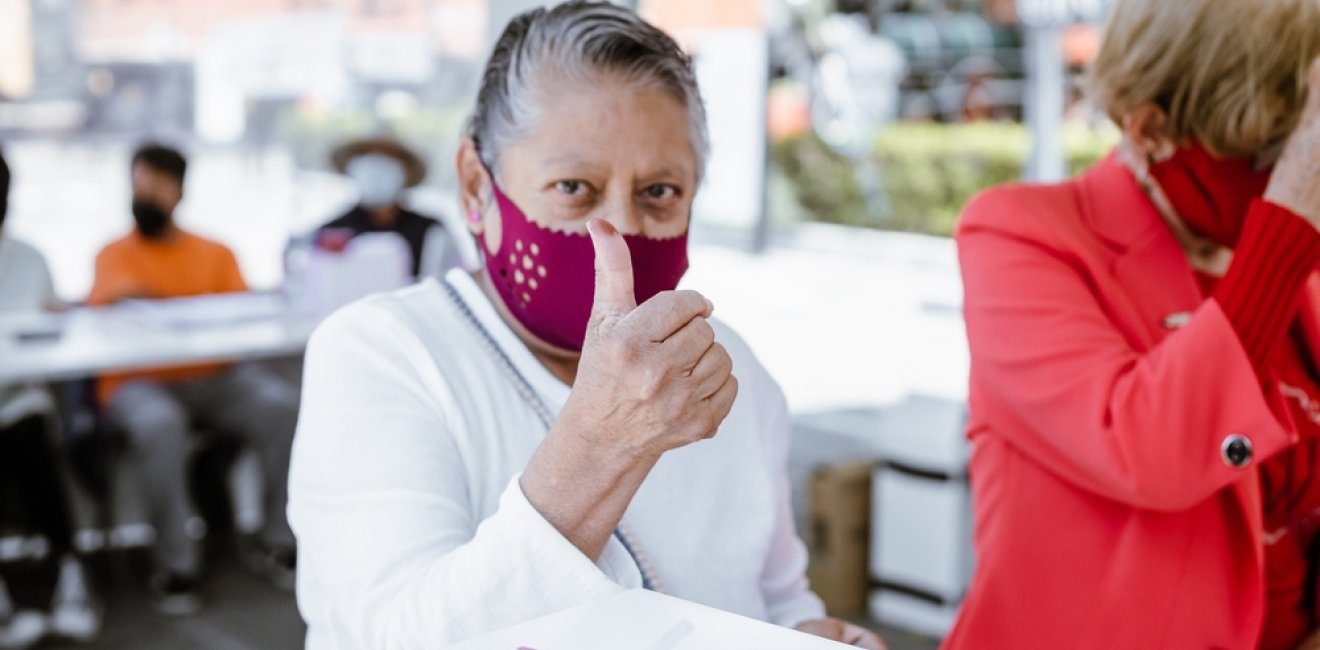The upcoming June 2 federal elections will mark a first for Mexico on many levels. Over 100 million Mexicans are set to vote for more than 20,000 federal and local posts, making these the largest elections in the country’s history. Unprecedented levels of violence have also tainted the process, with organized crime assassinating over 30 local candidates and community leaders. But most notably, it will be the first time a woman will become Mexico’s president.
Claudia Sheinbaum, the protégé of outgoing populist President Andres Manuel Lopez Obrador (AMLO) and candidate for the leftist National Regeneration Movement (Morena), is expected to win the election. Continuing AMLO’s anti-neoliberal “Fourth Transformation” socioeconomic project is central to her campaign. Yet, kickstarting a renewables transition, promoting scientific education, and revamping Mexico’s security strategy are some proposals differentiating Sheinbaum from her predecessor.
Trailing Sheinbaum by double digits is Xóchitl Gálvez, the unity candidate for the Institutional Revolutionary Party (PRI), the National Action Party (PAN), and the Party of the Democratic Revolution (PRD). Undoing AMLO-era reforms and promoting middle-class-centric policies are core to her campaign. Last in the race is the Citizen Movement’s (MC) candidate Jorge Álvarez Máynez, an outsider whose appeal among millennial voters risks diluting support for the other candidates, but mainly for Gálvez.
Amid this context, the electoral distribution of Congress will largely determine the next president’s ability to govern. Polls suggest that Morena and its allies, the Workers Party and the Green Party, are likely to keep their absolute majority in the legislature. However, they would fall short of the three-fourths qualified majority required for substantial constitutional reforms. Therefore, if elected president, consensus-based politics are likely to define Sheinbaum’s government, at least until the 2027 midterm elections.
Additionally, apart from their expected control of over half of all state legislatures, Morena and its allies lead the races for Mexico City and the governorships of Chiapas, Morelos, Puebla, Tabasco, and Veracruz. Effectively, Sheinbaum could arrive at the presidency with about two-thirds control of state governments, providing her enough political capital to implement her agenda at the local level with minor opposition.
Despite this favorable electoral backdrop, Sheinbaum faces key governability obstacles. For instance, the PRI, PAN, and PRD have since 2021 progressively worked on consolidating a united opposition front. Their better-than-expected performance during the legislative midterms that year, and unity behind Gálvez’s candidacy, point to a more organized effort to disrupt the “Fourth Transformation.” It also remains uncertain to what degree the MC will align with the traditional opposition to challenge Sheinbaum’s policies.
Maintaining unity within Morena amid reports of brewing factionalism will also pose a challenge for Sheinbaum. Since the party’s official formation in 2014, the gravitational pull of AMLO’s persona has coalesced diverse stakeholders whose ideologies range from the center to far left. Failure to align conflicting party interests could jeopardize Sheinbaum’s ability to govern, particularly when advancing policies that deviate from her predecessor’s political line or when seeking compromise with the opposition.
Beyond governability, the opposition and civil society organizations fear that AMLO, who claimed would retire from politics, will nevertheless exert undue influence in Sheinbaum’s government. This is troublesome as it relates to the health of Mexico’s democracy. AMLO’s administration attacked the independence of the judiciary, constrained oversight agencies, and even attempted—although thus far unsuccessfully—to dismantle the National Electoral Institute. The erosion of checks and balances could potentially continue under Sheinbaum.
On the economic front, Sheinbaum hopes for an annual GDP growth of three percent if elected to office. Although potentially within reach in 2024, this objective is ambitious in the long run given the gradual deceleration of Mexico’s economy since 2021, according to International Monetary Fund data. Likewise, despite pledging fiscal prudence, Sheinbaum’s plans to finance socio-economic assistance programs, infrastructure development, and the recovery of debt-ridden state-owned oil company Pemex will continue straining an enlarged deficit.
Notwithstanding the aforesaid macroeconomic outlook, the country faces a promising trade landscape. The deepening rift in U.S.-China commercial ties provides substantial momentum for nearshoring in Mexico, which, as of 2023, displaced Beijing as Washington’s main trading partner. Having expressed an ambition to bolster cooperation under the USMCA, a prospective Sheinbaum administration will seek to attract greater U.S. investment flows into manufacturing and flagship projects like her renewable energy initiative.
Curbing irregular migration also represents a top concern for a new president as it relates to the country’s relationship with Washington. With a record 2.5 million border apprehensions in 2023, expect Mexico to continue harboring asylum seekers while cooperating with Central America to reduce crossings at its southern border. Moreover, addressing the illicit flow of U.S. weapons to Mexico, as well as the entry of fentanyl and other narcotics into the United States, will remain key priorities for the bilateral agenda.
Overall, as Mexicans prepare to participate in their country’s largest democratic exercise to date, an apparent desire for continuity makes Sheinbaum inch closer to the presidency. Needless to say, the June 2 federal elections have the potential to redefine the political, economic, and social future of Mexico far beyond the upcoming six-year presidential term.
Author


Mexico Institute
The Mexico Institute seeks to improve understanding, communication, and cooperation between Mexico and the United States by promoting original research, encouraging public discussion, and proposing policy options for enhancing the bilateral relationship. A binational Advisory Board, chaired by Luis Téllez and Earl Anthony Wayne, oversees the work of the Mexico Institute. Read more

Explore More
Browse Insights & Analysis
Greenland’s New Governing Coalition Signals Consensus

The Future of France's Far-Right Party

Ukrainian Issue in Polish Elections



